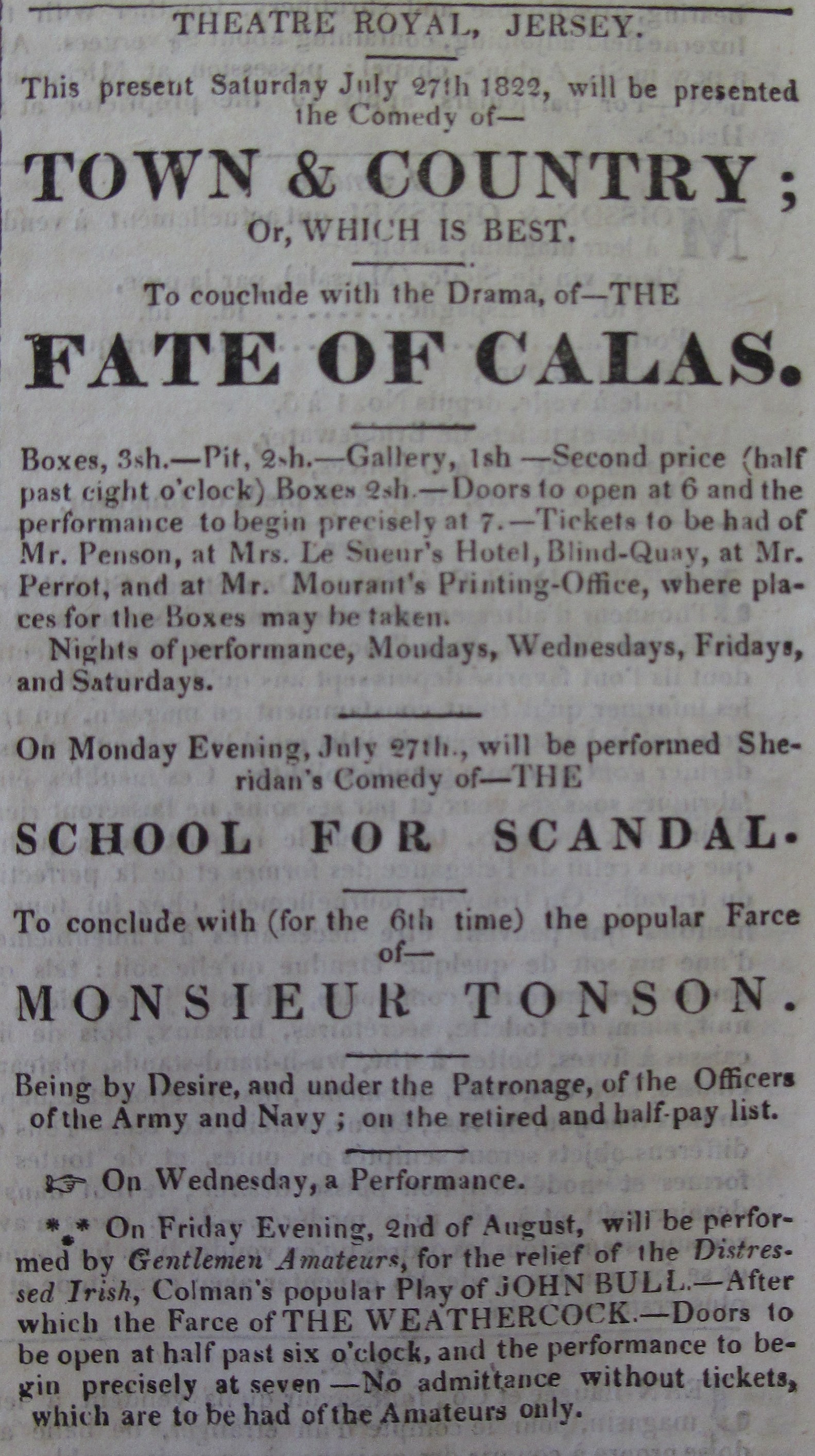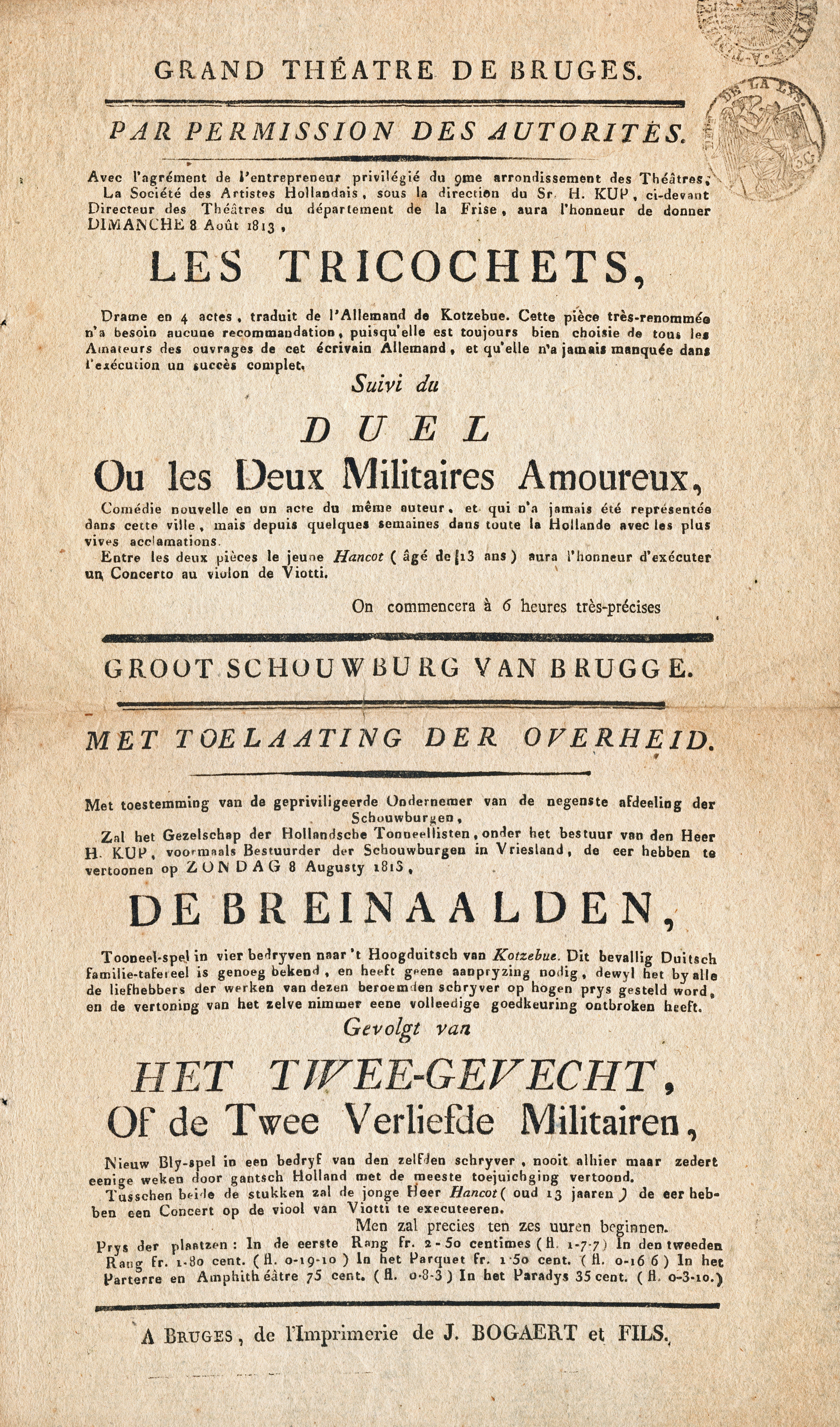|
Speed The Plough
''Speed the Plough'' is a five-act comedy by Thomas Morton, first performed in 1798 at the Theatre Royal, Covent Garden to great acclaim. It is mostly remembered today for the sake of the unseen character, Mrs Grundy. The play may have been inspired by August Kotzebue's ''Graf von Burgund'' ("Count of Burgundy"), which had recently failed at the same theatre. Kotzebue's more serious play also concerns a young man named Henry who is ignorant of his own origins. Plot summary Act 1 Mrs Ashfield is at the market when she is approached by a handsome young nobleman who gives her a letter to deliver to her husband. When Mr Ashfield reads it, he finds that it is from his daughter Susan, and he is astonished to learn that their former servant-girl, the middle-aged woman Nelly, has just married Sir Abel Handy. The gardener Mr Evergreen arrives to tell them that his master, Sir Philip Blandford, has just returned from twenty years abroad to have his daughter marry the son of Sir Abel Hand ... [...More Info...] [...Related Items...] OR: [Wikipedia] [Google] [Baidu] |
Thomas Morton (playwright)
Thomas Morton (1764 – 28 March 1838) was an English playwright. Life Morton was born in the city of Durham. He was the youngest son of John and Grace Morton of Whickham, County Durham. 26 January 1935, p. 69. After the death of his father he was educated at Soho Square school at the charge of his uncle Maddison, a stockbroker. Here amateur acting was in vogue, and Morton, who played with , acquired a taste for the theatre. He entered at , 2 July 1784, but was not called to the bar. His first drama, ''Colu ... [...More Info...] [...Related Items...] OR: [Wikipedia] [Google] [Baidu] |
Royal Opera House
The Royal Opera House (ROH) is an opera house and major performing arts venue in Covent Garden, central London. The large building is often referred to as simply Covent Garden, after a previous use of the site. It is the home of The Royal Opera, The Royal Ballet, and the Orchestra of the Royal Opera House. The first theatre on the site, the Theatre Royal (1732), served primarily as a playhouse for the first hundred years of its history. In 1734, the first ballet was presented. A year later, the first season of operas, by George Frideric Handel, began. Many of his operas and oratorios were specifically written for Covent Garden and had their premieres there. The current building is the third theatre on the site, following disastrous fires in 1808 and 1856 to previous buildings. The façade, foyer, and auditorium date from 1858, but almost every other element of the present complex dates from an extensive reconstruction in the 1990s. The main auditorium seats 2,256 people, mak ... [...More Info...] [...Related Items...] OR: [Wikipedia] [Google] [Baidu] |
Covent Garden
Covent Garden is a district in London, on the eastern fringes of the West End, between St Martin's Lane and Drury Lane. It is associated with the former fruit-and-vegetable market in the central square, now a popular shopping and tourist site, and with the Royal Opera House, itself known as "Covent Garden". The district is divided by the main thoroughfare of Long Acre, north of which is given over to independent shops centred on Neal's Yard and Seven Dials, while the south contains the central square with its street performers and most of the historical buildings, theatres and entertainment facilities, including the London Transport Museum and the Theatre Royal, Drury Lane. The area was fields until briefly settled in the 7th century when it became the heart of the Anglo-Saxon trading town of Lundenwic, then abandoned at the end of the 9th century after which it returned to fields. By 1200 part of it had been walled off by the Abbot of Westminster Abbey for use as arable l ... [...More Info...] [...Related Items...] OR: [Wikipedia] [Google] [Baidu] |
Mrs Grundy
Mrs Grundy is a figurative name for an extremely conventional or priggish person, a personification of the tyranny of conventional propriety. A tendency to be overly fearful of what others might think is sometimes referred to as grundyism. Mrs Grundy originated as an unseen character in Thomas Morton's 1798 five-act comedy ''Speed the Plough''. References to Mrs Grundy were eventually so well established in the public imagination that in Samuel Butler's 1872 novel ''Erewhon'', the goddess Ydgrun, an anagram for Grundy, dictates social norms. As a figure of speech, "Mrs Grundy" can be found throughout the English-speaking world. Original appearance Curiously for so famous a character, Mrs Grundy never actually appears in the play which introduced her, but is the continual object of the boastful Dame Ashfield's envious watchfulness, as is shown in the very first scene: :''Ashfield.'' Well, Dame, welcome whoam. What news does thee bring vrom market? :''Dame.'' What news, husband ... [...More Info...] [...Related Items...] OR: [Wikipedia] [Google] [Baidu] |
August Kotzebue
August Friedrich Ferdinand von Kotzebue (; – ) was a German dramatist and writer who also worked as a consul in Russia and Germany. In 1817, one of Kotzebue's books was burned during the Wartburg festival. He was murdered in 1819 by Karl Ludwig Sand, a militant member of the ''Burschenschaften''. This murder gave Metternich the pretext to issue the Carlsbad Decrees of 1819, which dissolved the ''Burschenschaften'', cracked down on the liberal press, and seriously restricted academic freedom in the states of the German Confederation. Life Kotzebue was born in Weimar to the respected merchant Kotzebue family and was educated at Wilhelm-Ernst- Gymnasium in Weimar, where his uncle, the writer and critic Johann Karl August Musäus was among his teachers. In 1776 the young Kotzebue acted alongside Goethe in the latter's play ''Die Geschwister'' when it premiered in Weimar. In 1777, aged sixteen, he enrolled at the University of Jena to study legal science. He continued his studie ... [...More Info...] [...Related Items...] OR: [Wikipedia] [Google] [Baidu] |
Ploughing Match
A ploughing match is a contest between people who each plough part of a field. Nowadays there are usually classes for horse-drawn ploughs and for tractor ploughing. Points are awarded for straightness and neatness of the resulting furrows. The annual 3-day long Irish National Ploughing Championships has grown into one of the largest outdoor events in the world, with commercial exhibits and a significant national media presence. In Ontario, the International Plowing Match The International Plowing Match (IPM), held annually in Ontario, is North America's largest outdoor agricultural and rural expo. It is usually held in late September, and usually attracts more than 80,000 visitorscontent over the 5-day event. Each I ... is an important rural event. References External links * http://www.ploughmen.co.uk/ * http://www.cheshireploughing.co.uk/ * http://www.ploughingmatch.co.uk/ * http://www.southwellploughingmatch.co.uk/ * http://www.plowingmatch.org/ * World Ploughing Match 19 ... [...More Info...] [...Related Items...] OR: [Wikipedia] [Google] [Baidu] |
1798 Plays
Events January–June * January – Eli Whitney contracts with the U.S. federal government for 10,000 muskets, which he produces with interchangeable parts. * January 4 – Constantine Hangerli enters Bucharest, as Prince of Wallachia. * January 22 – A coup d'état is staged in the Netherlands (Batavian Republic). Unitarian Democrat Pieter Vreede ends the power of the parliament (with a conservative-moderate majority). * February 10 – The Pope is taken captive, and the Papacy is removed from power, by French General Louis-Alexandre Berthier. * February 15 – U.S. Representative Roger Griswold (Fed-CT) beats Congressman Matthew Lyon (Dem-Rep-VT) with a cane after the House declines to censure Lyon earlier spitting in Griswold's face; the House declines to discipline either man.''Harper's Encyclopaedia of United States History from 458 A. D. to 1909'', ed. by Benson John Lossing and, Woodrow Wilson (Harper & Brothers, 1910) p171 * March – th ... [...More Info...] [...Related Items...] OR: [Wikipedia] [Google] [Baidu] |
Comedy Plays
Comedy is a genre of fiction that consists of discourses or works intended to be humorous or amusing by inducing laughter, especially in theatre, film, stand-up comedy, television, radio, books, or any other entertainment medium. The term originated in ancient Greece: in Athenian democracy, the public opinion of voters was influenced by political satire performed by comic poets in theaters. The theatrical genre of Greek comedy can be described as a dramatic performance pitting two groups, ages, genders, or societies against each other in an amusing '' agon'' or conflict. Northrop Frye depicted these two opposing sides as a "Society of Youth" and a "Society of the Old". A revised view characterizes the essential agon of comedy as a struggle between a relatively powerless youth and the societal conventions posing obstacles to his hopes. In this struggle, the youth then becomes constrained by his lack of social authority, and is left with little choice but to resort to ruses wh ... [...More Info...] [...Related Items...] OR: [Wikipedia] [Google] [Baidu] |
West End Plays
West or Occident is one of the four cardinal directions or points of the compass. It is the opposite direction from east and is the direction in which the Sun sets on the Earth. Etymology The word "west" is a Germanic word passed into some Romance languages (''ouest'' in French, ''oest'' in Catalan, ''ovest'' in Italian, ''oeste'' in Spanish and Portuguese). As in other languages, the word formation stems from the fact that west is the direction of the setting sun in the evening: 'west' derives from the Indo-European root ''*wes'' reduced from ''*wes-pero'' 'evening, night', cognate with Ancient Greek ἕσπερος hesperos 'evening; evening star; western' and Latin vesper 'evening; west'. Examples of the same formation in other languages include Latin occidens 'west' from occidō 'to go down, to set' and Hebrew מַעֲרָב maarav 'west' from עֶרֶב erev 'evening'. Navigation To go west using a compass for navigation (in a place where magnetic north is the same dire ... [...More Info...] [...Related Items...] OR: [Wikipedia] [Google] [Baidu] |






